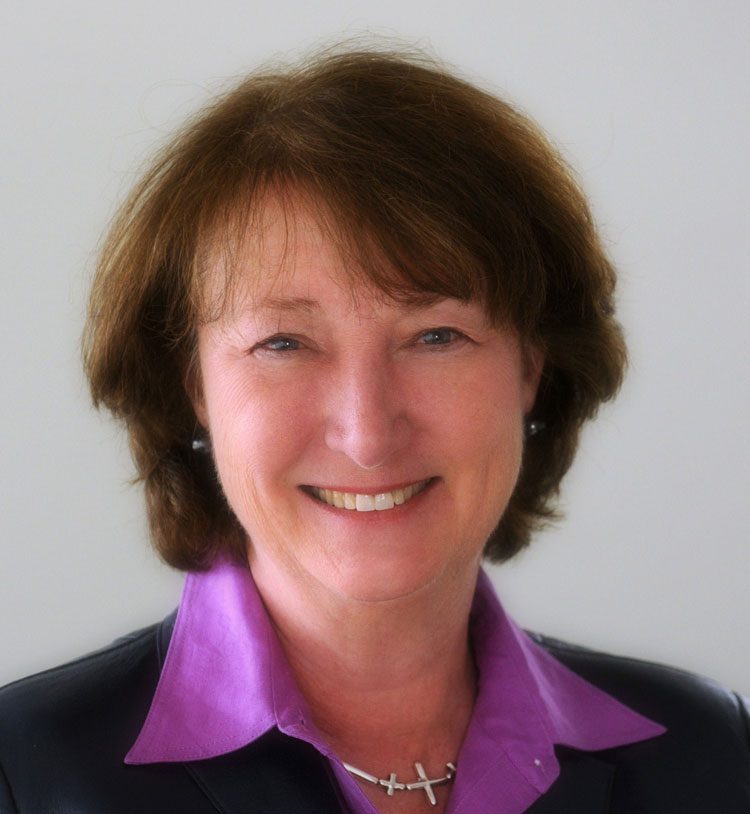Jenny Pomeroy Award for Excellence in Vision and Public Health
The Jenny Pomeroy Award for Excellence in Vision and Public Health is presented annually to an individual, group, or organization that has made significant contributions to the advancement of public health related to vision and eye health at the community, state, national, and/or international level. Among the highest honors that Prevent Blindness bestows, this prestigious award consists of formal acknowledgement and a commemorative plaque to be presented at webinar in the Fall of 2025 which builds on the theme of the 2025 Focus on Eye Health Summit. It further comes with an invitation to present this work as a speaker on the webinar. The award serves as a living memorial to Jenny Pomeroy, who served as the CEO of Prevent Blindness Georgia from 1996 until 2013 and brought a passionate understanding of public health to her work and our mission.
2025 Jenny Pomeroy Award for Excellence in Vision and Public Health

The Dean McGee Eye Institute (DMEI) was selected for this year’s Prevent Blindness Jenny Pomeroy Award for Excellence in Vision and Public Health for its significant contributions to vision and public health research. DMEI was formed in 1972 in Oklahoma City and dedicated to serving all Oklahomans and the global community through excellence and leadership in patient care, education, and vision research. Since the dedication of its original building in 1975, DMEI has grown into one of America’s largest and most respected centers for medical and surgical eye care with more than 200,000 total patient visits annually from all 77 Oklahoma counties and the surrounding region, and 9,000 major surgical procedures performed each year.
2024 Jenny Pomeroy Award for Excellence in Vision and Public Health
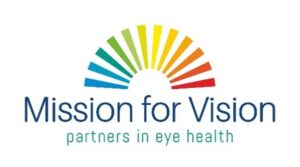
Founded in the year 2000, Mission for Vision seeks to restore the gift of vision to every visually impaired human being, irrespective of nationality, religion or socio-economic status. To date, MFV has positively impacted the lives of more than 19.7 million people in India, including the enablement of more than 3 million eye surgeries. MFV works in 24 Indian states and union territories with leading eye health partners.
Additionally, MFV has helped:
- Establish and strengthen 24 Secondary/Tertiary Eye Hospitals, ranking among the top in India, providing a model of sustainable social enterprises.
- Train more than 700 Allied Ophthalmic Personnel (AOP) particularly socio-economically challenged young rural women, each capable of serving at least 1,500 patients annually, enabling empowerment, augmenting service delivery and livelihoods.
- Establish 153 Vision Centers, including 5 mobile units, to enable primary eye care in remote geographies serving more than 7.3 million people and working towards achieving self-sustenance in around 3 years.
- Provide eye health services to over 830,000 children, including for complex conditions such as Retinopathy of Prematurity and Retinoblastoma.
- Generate valuable evidence on public eye health.
2023 Jenny Pomeroy Award for Excellence in Vision and Public Health
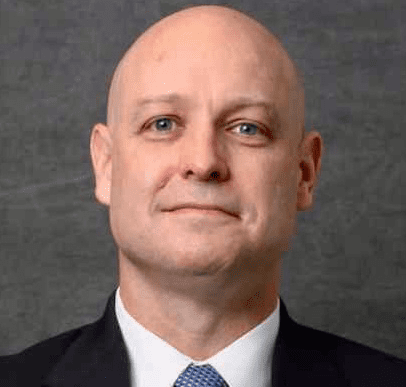 Dean A. VanNasdale, Jr., OD, PhD
Dean A. VanNasdale, Jr., OD, PhD
Associate Professor at The Ohio State University (OSU) College of Optometry
Dean A. VanNasdale, Jr., OD, PhD, Associate Professor at The Ohio State University (OSU) College of Optometry, was selected for this year’s Jenny Pomeroy Award for Excellence in Vision and Public Health for his significant contributions to vision and public health research. He has collaborated with the Centers for Disease Control and Prevention’s Vision Health Initiative to develop state profiles related to vision health and is conducting pioneering work in Ohio, using multiple surveys and administrative sources to estimate the impact of state policies on improving access to eye care. The goal is for this work to serve as a template for similar analyses in other states. More recently, he collaborated with VisionServe Alliance to develop a series of innovative state-level profiles regarding vision and health status among older people.
In addition to teaching students at the OSU College of Optometry, he serves as a mentor to master’s and PhD students working in population health. Dr. VanNasdale currently serves on the advisory committee for the Center for Vision and Population Health at Prevent Blindness, and is a member of the Vision and Eye Health Surveillance System (VEHSS) expert panel for NORC at the University of Chicago, and the Centers for Disease Control and Prevention.
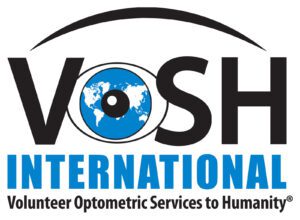
Founded in 1972, VOSH/International, a volunteer-based organization, was selected for the Jenny Pomeroy Award for Excellence in Vision and Public Health for its commitment to providing access to quality eyecare for underserved communities. The mission of V/I is to facilitate the provision and the sustainability of vision care by supporting eye clinics, optometry schools and optometric educators in geographical areas lacking sufficient eye care. The core programs include sharing U.S. optometric expertise with international schools of optometry through lecturing, mentorship, donating equipment and technology, and organizing educational and networking events to nurture collaboration to strengthen optometry globally. V/I also collects data from clinical work to generate the evidence and public health policy action to integrate eyecare within local health care systems worldwide. As of 2022, there are over 98 VOSH regional, state and school chapters globally.
Prevent Blindness has announced the recipient of the 2021 Jenny Pomeroy Award for Excellence in Vision and Public Health as R.V. Paul Chan, MD, MSc, MBA, FACS, Professor and Head, Department of Ophthalmology and Visual Sciences, The John H. Panton, MD Professor of Ophthalmology, Director, Pediatric Retina and ROP Service at the Illinois Eye and Ear Infirmary, University of Illinois at Chicago (UIC).
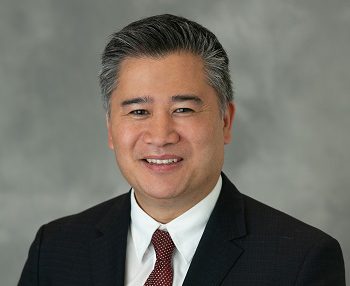
R.V. Paul Chan, MD, MSc, MBA, FACS
Dr. Chan was selected by an all-volunteer committee for his leadership in global retinopathy of prematurity (ROP) program development, pediatric retina, retinal imaging, and education. He has performed extensive basic and clinical research in adult and pediatric retina, retinopathy of prematurity, telemedicine, image analysis, and tele-education. Dr. Chan has significant experience in global ophthalmology and development of international clinical programs and global health curricula. He is also a consultant for Orbis International and on the Board of Trustees for Helen Keller International.
Additionally, Dr. Chan is a core team member of the Imaging and Informatics for ROP (i-ROP) consortium and leads the Global Education Network for ROP (GEN-ROP), which is an international collaboration of investigators with expertise in neonatology, ophthalmology, biomedical informatics, international health, and medical education. Together, they have developed tele-education and telemedicine programs, and have established clinical, teaching, and research collaborations in Asia, Latin America, and Africa. The i-ROP consortium, led by Dr. J. Peter Campbell with Dr. Michael F. Chiang and Dr. Jayashree Kalpathy-Cramer, developed the i-ROP DL system, an artificial intelligence algorithm for ROP that received breakthrough device status by the Food and Drug Association (FDA). They aim to globalize these efforts and improve access to such technology.
2020 Award Recipient – Children’s Vision Rehabilitation Program (CVRP) at West Virginia University
The CVRP, led by program director Rebecca Coakley, MA, CLVT, was selected by a volunteer committee for the program’s innovative approach to respond to the individual needs of visually impaired children, teachers, parents, and related professionals in West Virginia. Founded in 1996, the CVRP has a three-pronged approach in meeting the needs of blind/visually impaired children by:
- providing comprehensive low vision exams in the community.
- mentoring teachers of the visually impaired who are often isolated without appropriate support and training.
- creating and implementing special programing to address the “nonacademic” needs of the child with visual impairments to succeed in life.
To help children succeed outside of the classroom, the CVRP began a program to assist in mastering skills in relation to independent living, communication, organization, self-help, socialization, and self-advocacy. Last year, the CVRP held four events for
visually-impaired students: adventure camp, summer day camp, technology camp, and an orientation and mobility weekend trip to New York City. The CVRP and its low vision services continue to serve as a model for programs both nationally and internationally, including countries such as Canada and Egypt.
Cynthia Owsley, PhD, MSPH, Nathan E. Miles Chair of Ophthalmology and Director of the Clinical Research Unit at the University of Alabama at Birmingham (UAB) School of Medicine, Department of Ophthalmology and Visual Sciences

Dr. Owsley has over 30 years of experience conducting research on vision impairment, eye disease, and aging funded by the National Institutes of Health, the Centers for Disease Control and Prevention, non-profit foundations, and various industries. Her areas of focus include:
- vision impairment and driving
- age-related macular degeneration (AMD), glaucoma and diabetes
- quality of and access to eye care for under-served, older populations
- vision impairment and its impact on quality of life
At UAB, Dr. Owsley’s research program focuses on aging-related eye disease and vision impairment, using a variety of research techniques from epidemiology, clinical trials, psychophysics, health behavior, and health services research.
In addition to work in research and public health, Dr. Owsley has also been a longtime volunteer at Prevent Blindness, serving on various committees, including chairing its Scientific Committee for seven years, and served on the national Board of Directors from 2011-2018.
The Johns Hopkins University School-Based Eye Care Team. Team members include Megan E. Collins, MD, MPH; David S. Friedman, MD, MPH, PhD; Michael X. Repka, MD, MBA; Robert E. Slavin, PhD; and Nancy A. Madden, PhD.
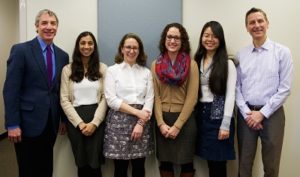
The team was selected for the award for their work investigating and addressing vision-related problems in high-poverty schools. This collaborative effort was designed to:
- increase access to pediatric eye care in high-poverty areas,
- develop and refine models for school-based vision programs,
- and advance research on the long-term impact of vision care on academic performance among students.
The team’s first project in school-based eye care was the Baltimore Reading and Eye Disease Study. Based on results from their earlier work, they are now working in partnership with Baltimore City Health Department, Baltimore City Schools, Vision To Learn, and Warby Parker on “Vision for Baltimore,” a city-wide school-based vision program.
The Johns Hopkins University team has now expanded this work, collaborating with Chicago Public Schools in the new “Vision for Chicago” research program to conduct a longitudinal assessment of the impact of glasses on academic performance, as well as the impact of a school-based professional development program on teacher engagement and student use of eyeglasses. With these projects, the team aims to lay the groundwork for reform of public school practices and national education policy regarding vision care, and potentially form alliances between educators and eye care professionals.
John Crews, DPA, Lighthouse Guild and Retired from CDC’s Vision Health Initiative
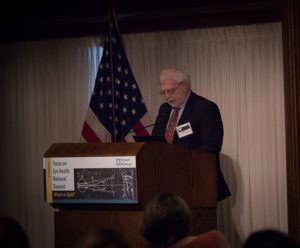
For more than 40 years, Dr. Crews has been dedicated to vision rehabilitation and disability research. He served as the Lead Scientist with the Disability and Health Team in the National Center on Birth Defects and Developmental Disabilities in the CDC. And, has worked for the Michigan Commission for the Blind and the Department of Veterans Affairs’s Rehabilitation Research and Development Center on Aging in Atlanta. Additionally, he served as chair of the Vision Care Section of the American Public Health Association.
Dr. Crews has just retired as Health Scientist for the Vision Health Initiative within the Division of Diabetes Translation at the CDC in Atlanta. His specialties are vision impairment and aging, caregiving and disability, and his research interests include health disparities among people with disabilities and aging with a disability. Dr. Crews has co-authored more than 115 publications and authored two books: “Vision Loss in an Aging Society” and “The Multiple Dimensions of Caregiving and Disability.”
Dr. Bruce Moore, New England College of Optometry
Dr. Moore was selected specifically for his work in regards to his significant contributions on a state and national level to advancements in vision and eye health and public health practice for children. He has served as a clinician, a professor, and a legislative advocate.
Dr. Moore is a primary investigator in the “Vision in Preschoolers Study” and the “Vision in Preschoolers-Hyperopia in Preschoolers Study” and was involved in the “Pediatric Eye Disease Investigator Group, Correction of Myopia Evaluation Trial.” Since 2010, he has been a principal volunteer for the Children’s Vision Massachusetts Coalition, representing it at national and statewide conferences and participating in countless local meetings with the purpose of advancing vision related public health practice in Massachusetts. He was a member of the National Center for Children’s Vision and Eye Health at Prevent Blindness expert panel and now serves on the Center’s advisory committee.
2015 – Rick Bunner
2014 – Prevent Blindness Georgia
Nomination Criteria:
Nominations may be made for an individual, group, or organization that has made a significant contribution to the field of public health and vision and eye health at the community, state, national, and/or international level. To receive the award, the recipient or representative (if a group or organization) must be available to present at a Focus on Eye Health Summit-themed webinar in the Fall of 2025. The date for the webinar will be made in collaboration with the recipient for this award.
